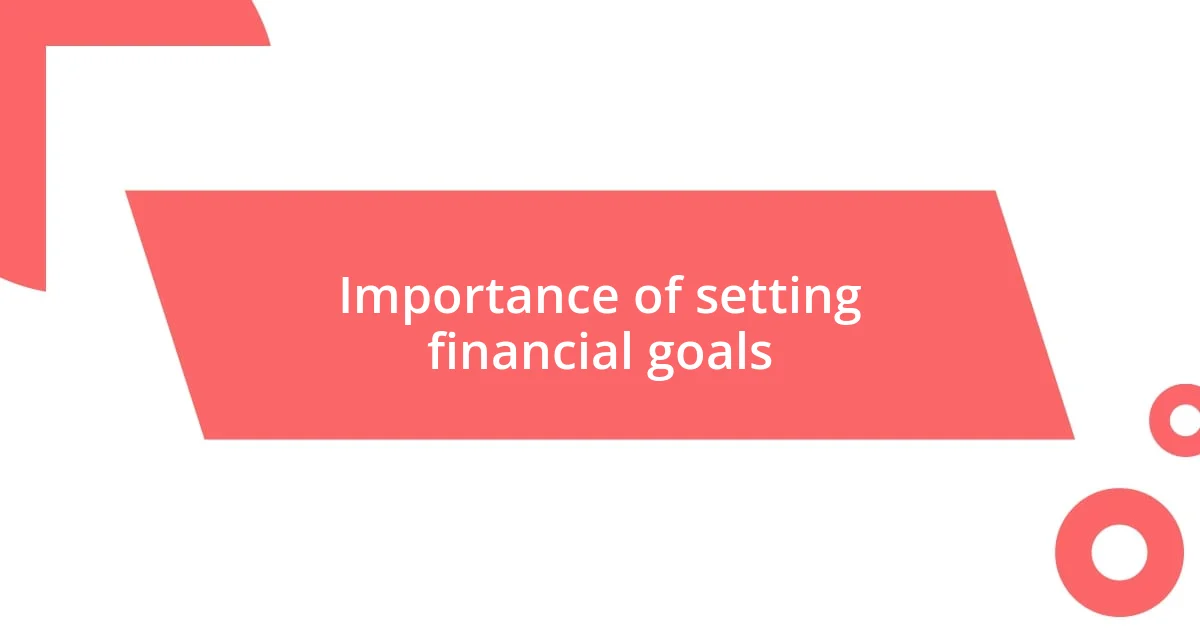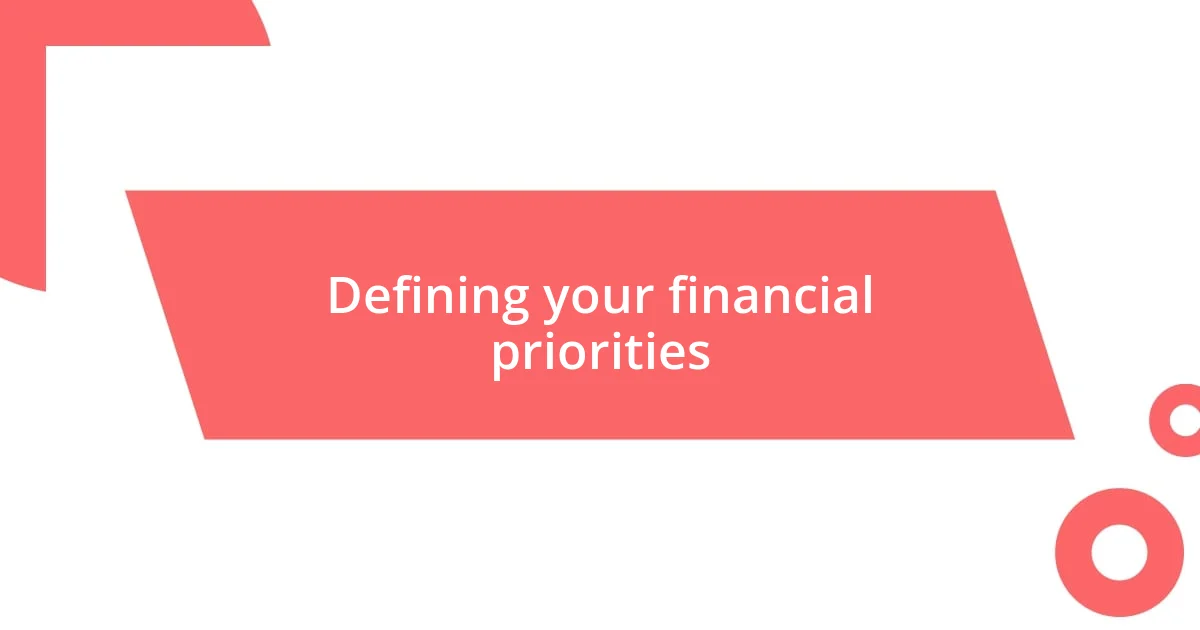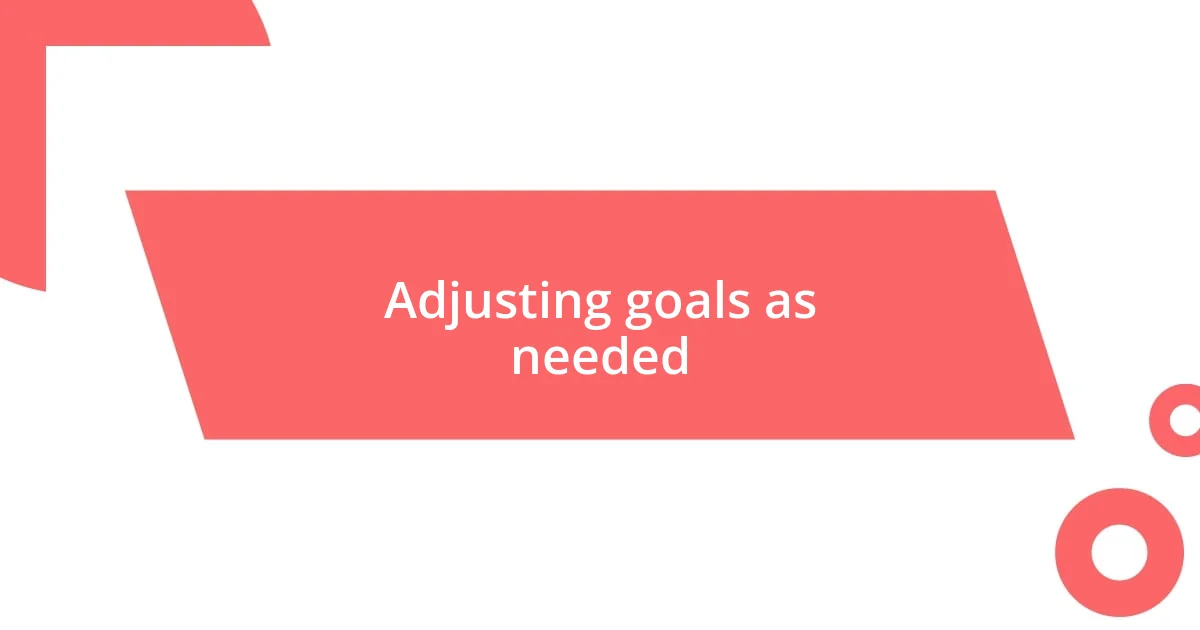Key takeaways:
- Setting specific and measurable financial goals provides direction, motivation, and accountability, transforming saving into a purposeful journey.
- Regularly reassessing and adjusting financial goals based on life changes helps maintain relevance and adaptability in financial planning.
- Connecting financial goals to personal aspirations and celebrating small victories keeps motivation high and makes the process enjoyable.

Understanding financial goals
Understanding financial goals is like navigating a map—it gives direction to our journey toward financial stability. I remember when I first set my savings goal for a vacation. It felt daunting, but that tangible target sparked my motivation and made every small sacrifice, like skipping a night out, feel worthwhile.
These goals can be short-term, like saving for a new gadget, or long-term, such as planning for retirement. Have you ever felt that rush of excitement when you’ve made progress toward a goal? For me, hitting that first milestone—having enough saved up to book my trip—was incredibly rewarding. It reinforced the idea that, with clarity and purpose, I could bring my dreams closer to reality.
However, it’s crucial to ensure that our goals are specific and measurable. Reflecting on my financial journey, I learned that generic wishes often led to frustration. When I switched from “I want to save money” to “I want to save $5,000 for a family reunion in a year,” I was able to create a concrete plan and track my progress more effectively. This clarity not only reduced stress but also made the entire process enjoyable.

Importance of setting financial goals
Setting financial goals is crucial for creating a solid foundation for our financial future. When I decided to save for my first home, having a specific target really shifted my perspective. It wasn’t just about saving money anymore; it became a journey filled with purpose and determination. Every dollar saved felt like a step toward something meaningful.
Here are some reasons why setting financial goals is so essential:
- Direction and focus: Clearly defined goals give you a roadmap to follow, steering your financial decisions.
- Motivation: Achieving smaller milestones can create a sense of accomplishment that fuels your drive to reach larger objectives.
- Prioritization: Goals help you determine which expenses are necessary and which can be trimmed, leading to more efficient budgeting.
- Accountability: Having defined goals makes it easier to hold yourself accountable and track your progress.
- Peace of mind: Knowing you have a plan in place alleviates anxiety about financial uncertainty and fosters a greater sense of control over your future.

Defining your financial priorities
When it comes to defining financial priorities, the first step is discerning your values. Personally, I’ve found that aligning my financial goals with what truly matters to me—like education or travel—creates a more meaningful path. For example, when I prioritized saving for a family trip over many small luxuries, I felt more fulfilled, as it was an investment in experiences that would bring joy and connection.
I often reflect on how my priorities evolved over the years. Initially, I didn’t see the long-term benefits of investing in my health through a better diet; I opted instead for convenience. However, once I realized that health contributes to my overall well-being and ability to work toward financial goals, I started making healthier choices that saved money on future medical expenses. It’s eye-opening how our financial priorities can shift with new insights, isn’t it?
Lastly, it’s important to frequently reassess your financial priorities. Life changes, and so should our goals. One year, I focused on paying off debt after a significant life event, and another year, my main goal was building an emergency fund. This flexibility helped me stay aligned with my evolving situation and made financial planning feel much more relevant and achievable.
| Financial Priority | Example |
|---|---|
| Short-Term | Saving for a vacation |
| Long-Term | Saving for retirement |

Creating SMART financial goals
Creating SMART financial goals is an invaluable step towards achieving financial security. I remember when I set a goal to save for an emergency fund. By breaking it down into Specific, Measurable, Achievable, Relevant, and Time-bound (SMART) components, I found clarity. For example, instead of vaguely saying, “I want to save money,” I pinpointed, “I will save $5000 in 10 months.” That concrete target kept me focused and motivated.
When crafting your SMART goals, think about the relevance to your life. I once set a target to save for a new laptop, but I realized that my current laptop was adequate for my needs. Instead, I shifted my focus to a more relevant goal: saving for a career development course. It’s fascinating how aligning your goals with true personal growth not only brings satisfaction but makes the journey enjoyable, wouldn’t you agree?
Don’t forget to track your progress regularly. Each month, I would assess how much I saved and, more importantly, celebrate the small victories along the way. It created a sense of accountability that propelled me forward. The end result? Not just reaching my ultimate goal, but enjoying the process of getting there. How about you? What financial goals could you redefine using the SMART framework?

Tracking your progress effectively
Tracking progress effectively is key to staying motivated on your financial journey. I recall a time when I set a savings target for a home renovation. At first, I felt overwhelmed, but breaking it down into monthly milestones transformed the process. I created a simple spreadsheet to mark my progress, and seeing those numbers inch up month after month brought an unexpected thrill. Have you ever felt that excitement when you hit a milestone, no matter how small?
Regular check-ins are essential for keeping your goals on track. I remember scheduling a dedicated time each month to review my finances—this routine not only kept me accountable but also helped me identify any adjustments I needed to make. If I overspent on dining out, I could shift funds from my entertainment category to ensure I still met my targets. It felt like having a financial compass guiding me through the month’s ups and downs.
Visual reminders can also powerfully reinforce your commitment. I once created a vision board filled with images of my financial goals—a cozy home, a dream vacation, and a healthy emergency fund. Each time I saw it, I felt renewed motivation coursing through me. What visual tools do you find inspiring? Tracking progress goes beyond just numbers; it taps into our emotions and aspirations, reminding us why we set those goals in the first place.

Adjusting goals as needed
Adjusting your financial goals isn’t just a smart move; it’s a necessary part of the journey. I remember a time when I was laser-focused on saving for a new car, but as life unfolded, I faced unexpected medical expenses. So, instead of my original plan, I redirected my efforts towards building a health fund, which not only eased my stress but also turned out to be crucial. Has there been a moment in your life when you realized your priorities needed to shift?
Life has a way of throwing curveballs, and being able to adapt my goals was empowering. For instance, I initially aimed to save a certain amount by the end of the year, but when I landed a freelance project, I seized the opportunity to squeeze that timeline without overwhelming myself. This flexibility allowed me to decide more clearly how to allocate my resources without feeling pressured. How do you respond when your financial landscape shifts unexpectedly?
Ultimately, adjusting goals gives us clarity on what matters most at any point in time. When I decided to revise my savings goal to account for an exciting trip rather than just a long-term investment, I found that changing my focus reignited my passion for saving. It transformed what could have felt like a chore into an adventure. Have you ever experienced that shift in motivation when you realign your financial aspirations?

Staying motivated to achieve goals
Staying motivated can sometimes be tricky, but I’ve found that connecting my financial goals to something deeply personal can reignite that spark. A few years ago, I dreamt of traveling abroad, so I started saving specifically for a trip to Japan. Every time I put money aside, I imagined myself wandering the streets of Tokyo, tasting delicious ramen, and soaking in the cherry blossoms. How do you make your goals more tangible?
Another technique that keeps me inspired is celebrating small victories along the way. For instance, when I hit my first savings milestone for the Japan trip, I treated myself to a small celebratory dinner. That moment reminded me of the joy embedded in my journey, reinforcing my commitment to the larger goal. Have you ever felt that rush of pride after reaching a mini milestone?
Additionally, I find that sharing my goals with supportive friends or family can enhance my motivation. When I told my best friend about my travel plans, she held me accountable and cheered me on during those moments of doubt. It became a shared adventure in a way, as I often bounced ideas off her about how best to save. Who in your life could you share your financial aspirations with? Engaging with others not only makes the journey more enjoyable but also amplifies my determination to succeed.













